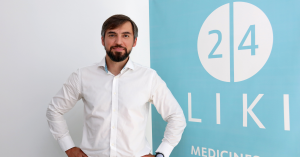Intelligencia, the AI software platform that helps pharmaceutical and biotechnology companies reduce drug development risks and introduce new drugs to market faster, raised $12M In a Series A round led by the European health tech investor MTIP. Two of the previous seed-round investors, the Greek Big Pi Ventures and Synetro Group, also participated and were joined by the international analytics biopharmaceutical company ZS.
The round will be used for product development and the expansion of its Greek R&D team, for an increase in sales and expansion of its customer success teams. The startup will also aim to develop new partnerships with clients and partners to incorporate more data in its algorithms.
As the success rates of clinical drug development which historically has been around 10% are falling, and the average expenses of bringing a new drug to market are estimated at $2.6B, it is getting increasingly difficult and costly for pharmaceutical companies to provide patients with new drugs. This is where Intelligencia comes to fill in the market gaps. With the mission to bring innovative therapies to patients faster and with reduced risk, the company offers drug development companies ML-fueled predictions about the trials they conduct to aid their critical decision-making process.
Assess, quantify and reduce the risk of drug development
The Greek founders of Intelligencia, Dimitrios Skaltsas and Vangelis Vergetis, have a longtime background in healthcare consulting. They worked for McKinsey & Company previous to founding their company in 2017. For its four years on the market, the company has created a team of 40 software engineers, AI specialists, scientists, and drug development practitioners which are dispersed between the New York headquarters and the R&D center in Athens, Greece.
Unlike other tech startups in the pharmaceutical field that aim to enable pharmaceutical companies to search for drugs with their own AI, Intelligencia partners with pharmaceutical companies to provide them with software that can reduce the chances of failure in drug development and clinical trials. By using AI to predict the result of a particular clinical trial, it makes recommendations on how to improve them, and suggests other relevant areas for research to explore. To offer accurate predictions and analysis the proprietary algorithms of the platform assess more than 1.5B data points across clinical trial design, clinical outcomes, drug biology, funding, regulatory pathways, patients, and medical publications.
Basically, it de-risks the drug development process. Besides estimating the risk of failure, the platform analyses the factors that hinder the success of the trial. The main value proposition of the company is that its data-driven methodology is able to accurately assess risk both across internal development programs and across external business development programs and partnerships.
Vangelis Vergetis refers to the movie “Moneyball” with Brad Pitt who uses data to build a winning baseball team to explain how his team brings innovation in the healthcare industry. “In a similar way, we combine carefully curated data (biological, clinical, genomic, etc.) together with AI in order to revolutionize how drug developers think about and assess the risk of their pipelines and specific development programs,” he says.







